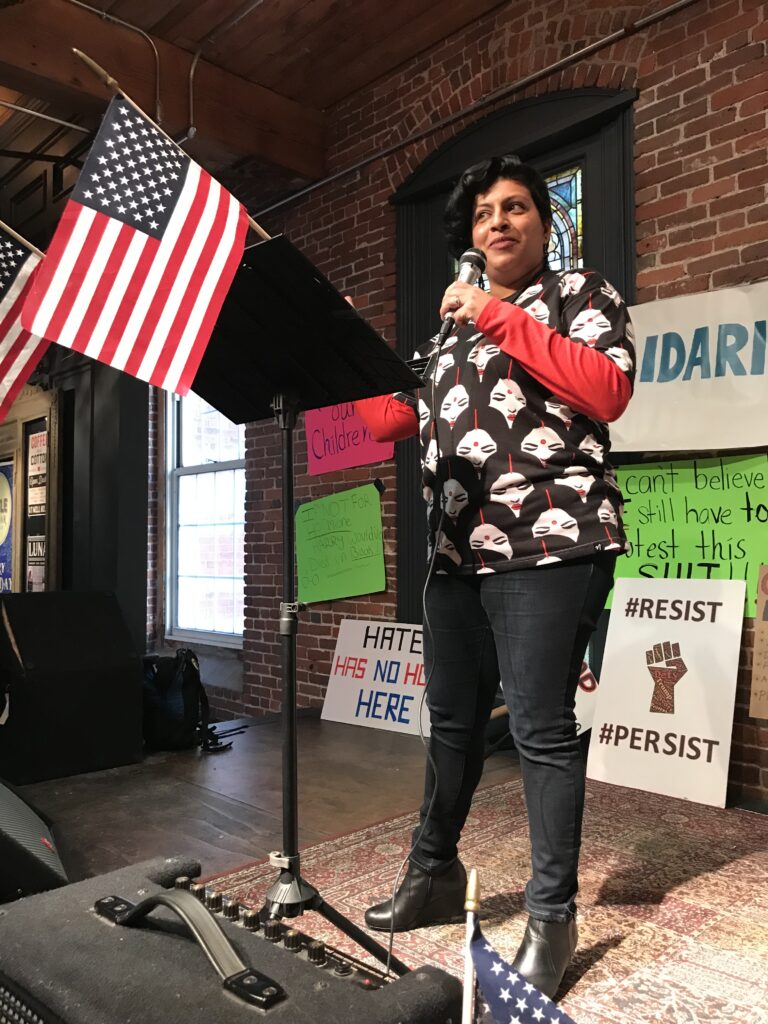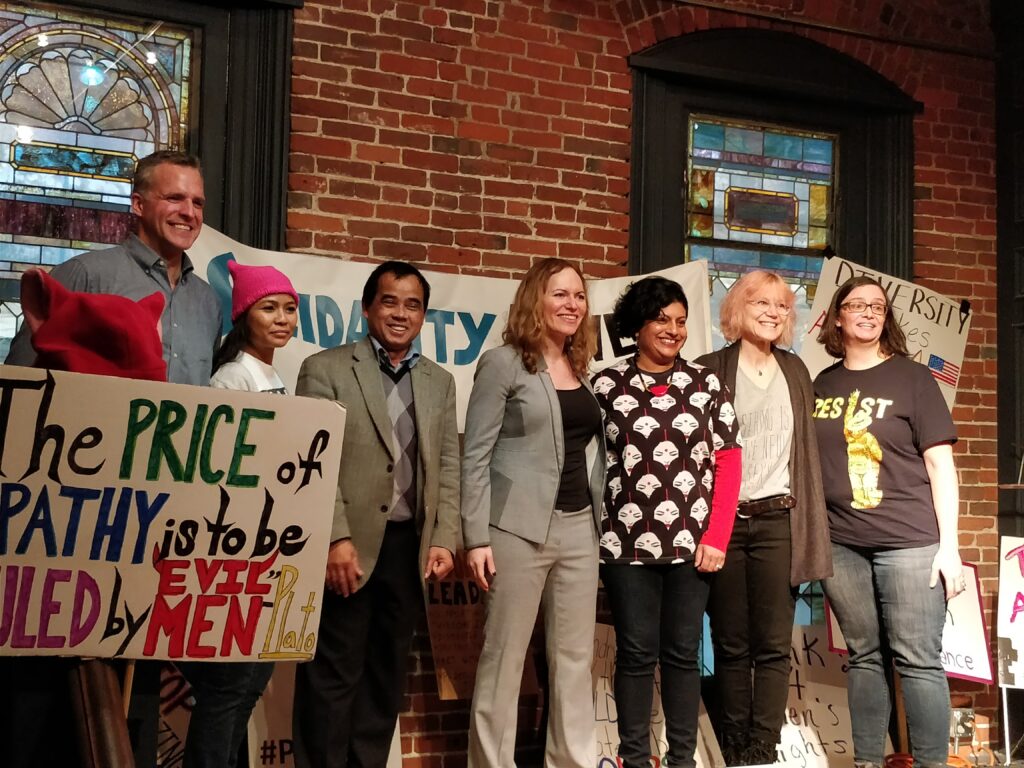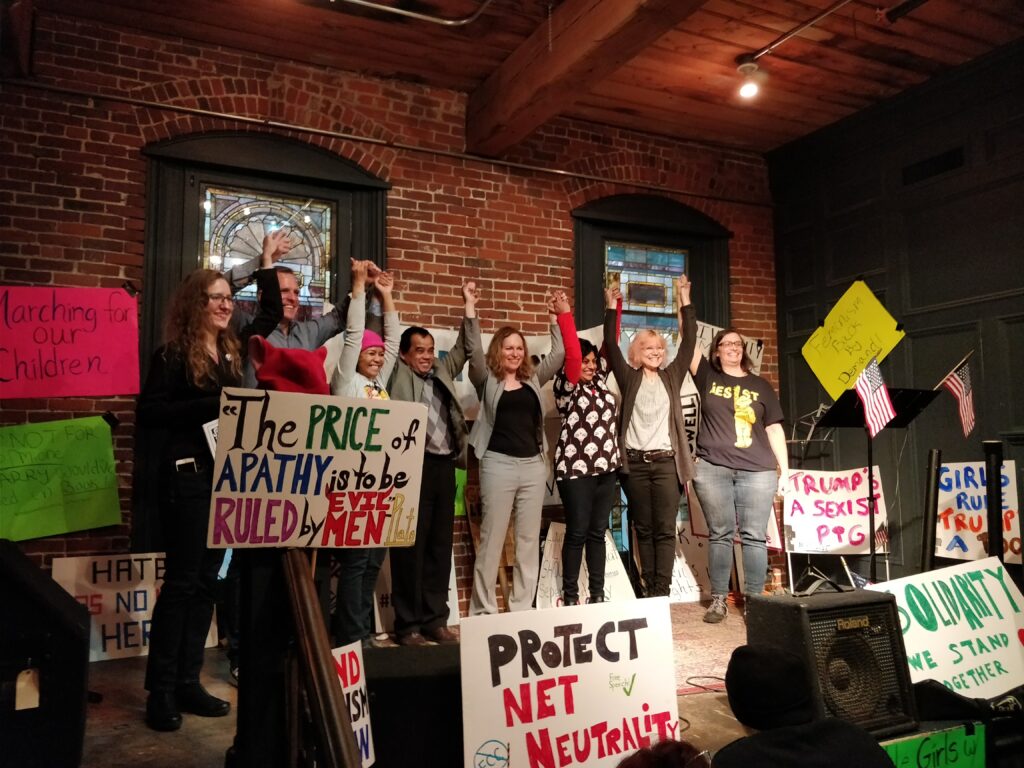Good afternoon and thanks for inviting me out to Lowell. Marissa gave a great introduction of me — a few things I want to add that are relevant to my speech in terms my own identity: I am Indian-American, I’m heterosexual, I’m cisgender, and I grew up in Iowa. I now live in Melrose and made the trip out to Lowell!
Thank you to Hope Anderson for inviting me here today, and to Marissa and all the others from Solidarity Lowell who worked hard to put today’s events together. This weekend, one year into the current presidential administration, serves an important purpose. It re-energizes us, it shows the world we are still here, and we still have a lot of fight left within us.
That said – it exhausts us too. Many of us are existing in the context of having open wounds that have little chance to heal before the next piercing laceration. This is even more true if we are part of any marginalized group. It’s tough to reconcile our intentions to be inclusive with our desire for our own pain and our individual and collective identities to be recognized. Many important conversations have taken place over the last year. One of these that I believe is imperative to recognize is the role of gender identity in our feminism.
Yesterday, when I got home from the rally and call to action at Cambridge Common, I saw a Facebook post from my friend Ev Evnen. I asked for their permission to share the following quote:
“I know I’m not the only trans person who’s feeling particularly invisible today. Sending so much love to my trans family. We are real, we are here, and we are powerful.
Please remember: some women have penises. Some men have vaginas. Not all people are men or women. You do not know someone’s gender based on their appearance. Biological essentialism is inherently anti-feminist.”
Whether it’s including those whose identity does not fall along a male/female or a gay/straight binary, including Black, Latinx, Indigenous, Asian, and Multiracial people and their voices in our actions and conversations, considering different perspectives across faiths and traditions — true inclusion will not only require our good intentions, but our continued willingness to be uncomfortable as we redefine our norms and change our questions and approach.
What a year it has been. One year ago today, I was in Downtown Boston for my first day of class with Emerge Massachusetts, a candidate training program for Democratic women interested in running for elected office. And, as this audience knows, it was also the day after the Presidential Inauguration and the day of the Women’s March. Millions of people poured into the streets to say we will not be squashed, and we will not allow this vulgar man to dictate our values or what our humanity and our country are about. It was an invigorating and cathartic experience after the malaise and despondency that followed the election.
Among those I met that day was Lisa Peterson, a fellow Emerge classmate, newly elected in November 2017 just like me. Councillor Peterson reached out to me when she learned that Solidarity Lowell was looking for speakers for today’s event, and she connected me to this opportunity. This is one of the things I loved most about my experience with Emerge. We all lift each other up and support each other. We are strong as individuals and even stronger together. Thank you, Lisa.
As I reflected on the past year, I realized that this journey didn’t start just one year ago. I reviewed the long list of things that have happened since 45 declared his candidacy – and meanwhile, also recognized that our problems didn’t start then, either.
But just as a reminder, here are a few of the things that have happened since Donald Trump declared himself a candidate on June 16, 2015. The shooting in Charleston happened the next day. Ten days later, marriage equality became the law of the land. The day after that, Bree Newsome took down the Confederate Flag at the South Carolina State House. A few weeks later, Sandra Bland was found dead in her jail cell. In December 2015, the shooting in San Bernardino happened, and a few days later candidate DT called for a Muslim ban. President Obama’s last state of the union address was on January 12, 2016, and four days later a state of emergency was declared in Flint, Michigan. On June 10, I was at the Pride Parade in Boston and two days later the Pulse nightclub shooting happened in Orlando. On October 7, the Access Hollywood tape was released. Election day was on November 8… and inauguration day was on January 20. Within hours of the inauguration, references to the LGBTQIA community were removed from the White House website. One year ago, many of us marched. On January 24, 2017, he issued a memorandum allow the federal government to go forward with the Dakota Access Pipeline. The day after that, 45 issued an executive order to build a wall. And two days after that, he issued a travel ban for seven Muslim-majority countries. I could go on and on — since then it’s been a constant… Tweetstorm.
When I first heard about efforts to march again and hold rallies across the country on this weekend, I’ll be honest I was a little worried about crowd size.
But then, I realized — it isn’t about that. Hundreds of us have run for office and thousands of us have supported our campaigns. Many of us have deluged Congress with postcards and filled their voicemail with calls to denounce the latest policy.
The forces of hatred are daunting. They have many of us flailing, wanting to fight against this hate and not wanting to let ourselves become divided. With each act of hatred, members of our community are affected on a deeper and more personal level. We must look out for our friends and neighbors, those who might feel the most affected. Let’s look within, and recognize and extinguish seeds of hate within ourselves. Let’s take care of each other, and let’s fight against hate.
To conclude, here are five things I have learned over the last couple of years.
- Symbols matter. Whether it’s putting up a rainbow flag or taking down a Confederate one.
- Words are important. Yes, Black Lives Matter. Yes LGBTQIA equality and justice are critical. Yes we must combat Islamophobia.
- Reach out. Each of these incidents affect us deeply, and may affect our friends and acquaintances even more personally. Check on your friends.
- Diversify your circle. If you don’t know people with a certain profile – or at least don’t know them well enough to combat your stereotypes, reservations, or fears, get to know them. Once you get to know people who are different from you, you find out just how much you have in common.
- Take action. Do all of the above. Educate yourself. Vote. Speak up. Stand up to bigotry. Spread messages of inclusion and love.
I’m not sure whether it is going to be okay. It’s not okay now, and the path forward seems filled with obstacles. We all need to give ourselves space, to care for ourselves as we care for our communities.
We also, from time to time, may find ourselves “sheetcaking” to escape it all. We can give ourselves permission to take short breaks.
But then, we can continue to show up. We can continue to be there for each other. We can continue to show our kids that fighting for justice, diversifying our circles, and getting to know our neighbors are vital parts of being part of a community. I know we are in this for the long haul, and I’m glad we will continue marching forward together.

Manisha Bewtra speaking at the Solidarity Lowell Women’s March in 2018. 
Manisha Bewtra speaking at the Solidarity Lowell Women’s March in 2018. 
Manisha with the other speakers and event organizers at the Solidarity Lowell Women’s March, January 21, 2018. 
Manisha with the other speakers and event organizers at the Solidarity Lowell Women’s March, January 21, 2018.
This event was covered in the Lowell Sun.